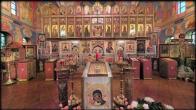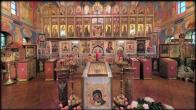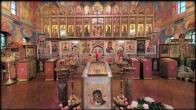You are here
On non-condemnation
The beginning of salvation is the condemnation of oneself. Let us be attentive to ourselves - then we will not begin to condemn others, for much of that for which we condemn others is in us ourselves.
Venerable Nilus of Sinai
Whose work is it to disturb, to condemn and to harm, if not that of the demons? And here we prove to be helpers of the demons in our own perdition and our neighbor's. Why is this so? Because there is no love in us! For "love will cover a multitude of sins" (I Peter 4:8, NKJV). The saints do not condemn one who sins and do not turn away from him, but suffer with him, grieve over him, make him to understand, comfort him, heal him, as a sick member, and do everything in order to save him.
Abba Dorotheus
Do not condemn any mortal, lest God abhor thy prayers.
Venerable Anthony the Great
Whoever is curious about the sins of others, or judges his brother on suspicion, has not yet laid the beginning of repentance and has not taken care to get to known his own sins, which are truly heavier than a lead weight of many pounds, and does not known why a man who loves vanity and seeks after falsehood becomes slow of heart (cf. Psalm 4:3), and therefore, as a man senseless and roaming in darkness, he, leaving his own sins, dreams of those of others, whether true or imagined on suspicion alone.
Venerable Maximus the Confessor
From self-love and self-opinion, a certain other evil is engendered in us, which causes us serious harm, namely severe judgment and condemnation of our neighbor, whereby we later hold him to be of no account, despise and demean him at any opportunity. By imparting a high value to ourselves and by thinking highly of ourselves, we naturally look down haughtily on others, we condemn and despise them, since it seems to us that we are far from those shortcomings of which others, as we think, are not devoid. But that authority is not given to thee, and by assuming this authority for thyself, thou thyself in this moment becomest worthy of judgment and condemnation, not before feeble men, but before God, the omnipotent Judge of all.
Venerable Nicodemus of the Holy Mountain
* * *
And what pretension we have when we try not to understand a man, but to judge about him and, what is worse, to judge him.
To judge a man, a neighbor, is to judge oneself.
In condemning a man, thou expressest only what is bad in thee.
When a man is being judged, look not at this judgment, but try to understand the one being condemned. Condemnation of a man is the vomiting forth of one's own defilement.
In condemning a man, thou art, in point of fact, condemning God's design; and who art thou?
* * *
A brother asked Abba Moses, what helps a man in all of his difficulty? The elder replied: God helps, for it is written: “Our God is refuge and strength, a helper in afflictions which mightily befall us.” (Psalm 45:1). The brother again asked: why are fasts and vigils to be observed? The elder replied: All of this humbles our soul, for it is written: “Behold my lowliness and my toil, and forgive all my sins.” (Psalm 24:18). If the soul brings forth these fruits, in return God extends to it His mercy.
The brother asked: what should a man do when either temptation or an evil thought attacks him? The elder answered him: Then must a man tearfully implore God to show forth His grace and assistance; if he asks with discernment, he will soon become calm. For the Scripture says: “The Lord is my helper, and I will not fear what men shall do unto me.” (Psalm 117:6).
The brother asked: if a man should beat his servant for some fault, what should the servant say to him? The elder replied: if the servant is good, he will say: Have mercy on me - I have sinned! The brother asked: and should he say nothing else? The elder responded: Nothing, for when the servant confesses his fault and says, I have sinned, his lord will quickly show him mercy. In all of this the goal is not to condemn one’s neighbor. For when the hand of the Lord was killing the firstborn in the land of Egypt, there remained no house without one dead in it. The brother asked: what do your words mean? The elder replied: they mean that if we are attentive towards our own sins, we will not be looking at the sins of others. For it is human folly to leave one’s dead body and to go and grieve over the dead body of his neighbor. To die for one’s neighbor also means to be aware of one’s sins and not to consider whether someone else is good or bad. Do not do evil towards anyone; do not think evil thoughts in your heart about anyone. Do not associate with one who harms his neighbor, and do not rejoice together with one who does evil to another. Do not reproach anyone, but say instead: God knows each person. Do not agree with the slanderer, do not entertain yourself with his evil speech. But also, do not feed the hatred of one who reviles his neighbor. Here is what, according to the Scriptures, it means to not condemn: “Judge not, lest ye be judged.” (Matthew 7:1). Neither bear enmity for anyone, nor nurture in your heart enmity for your neighbor. This is what peace means. Comfort yourself with the fact that difficulty is of short duration, while the peace and calm which follows is eternal, through the grace of God the Word. Amen.
(Excerpted from the book Memorable Stories Regarding the Struggles of the Saints and Blessed Fathers. Published by “Eternal” Press, 1965.)
PARISH LIFE
RECENT VIDEOS
Address of our Cathedral
Subscribe to our mailing list
While all the materials on this site are copyrighted, you may use them freely as long as you treat them
with respect and provide attribution on the Russian Orthodox Cathedral of St.John the Baptist of Washington DC.









